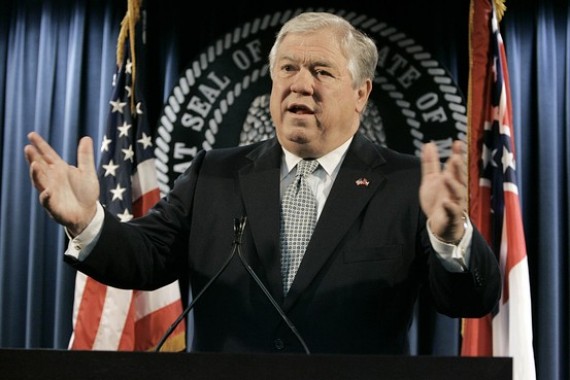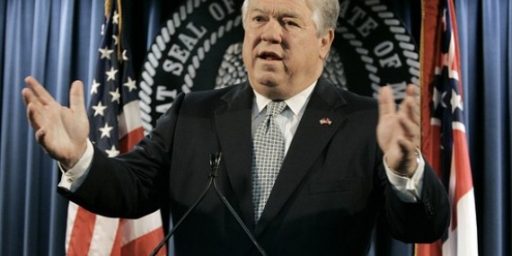The Problem that Barbour has Conjured
What the Haley Barbour situation illustrates is that we, as a country, have not fully accepted or dealt with our own past.
 Pursuant to Doug Mataconis post, Haley Barbour Stupidly Reopens An Old Wound (not to mention the broader blogospheric reaction to Barbour’s comments), let me say a few things (and, no doubt, more needs to be said).
Pursuant to Doug Mataconis post, Haley Barbour Stupidly Reopens An Old Wound (not to mention the broader blogospheric reaction to Barbour’s comments), let me say a few things (and, no doubt, more needs to be said).
Here’s the problem: a lot of people want to pretend like Brown was decided and then the Civil Rights and Voting Rights Acts were passed and then we entered a new era smoothly and completely.
This was not the case.
The passage of landmark legislation in 1960s still meant the problems of implementation, not to mention the fact that the reason the court decisions and the legislation was needed was because of the prevailing attitudes in the society. The fight did not end in the 1960s. It continued into the 1970s and 1980s (and beyond). To pretend like all of this is some distant past, and not within living memory is to ignore reality.
To say this is not to claim that everyone in the South was (or is) a racist, but to point out what ought to be obvious: there was a sustained fight to provided equal rights for US citizens of darker skin that started in earnest in the 1950s (although, arguably, it began roughly a century earlier). It took marches, sit-ins, protests, Supreme Court decisions, numerous laws, and even deployment of the National Guard (amongst other things) just to get to the point where African-Americans were granted the legal right to vote and full equal protection under the law.
Let the most simple of those facts sink in: we cannot claim to have achieved full universal suffrage in the United States of America, land of the brave, home of the free, cradle of constitutional democracy and all of that until the middle 1960s.
Let that sink it.
Quite frankly, this is a fact that we don’t like to dwell on. In fact, we tend to treat the entire history of it with a great deal of denial. We like to wave our hands and say “we fixed it” and so we can move on now. It is the say sort of hand-waving that allows some people in South Carolina to pretend like the Civil War was about something other than slavery.
When Barbour (or really anyone) downplays all that went it, it picks at this still not fully healed wound. We need to be more honest about our past and the way that that past continues to effect the present.
I say this, by the way, as someone who lives in the Deep South (Alabama) and while things have gotten substantially better, it is impossible not to see the ongoing legacy of the past all around me.
A simple anecdote. I was talking to a women from Birmingham, AL just last week. She and her husband were both black, He had been a firefighter for 30 years in the city. When he first got on the force in the 1970s he was the only black man assigned to his station. A noose was once put in his locker. The other firefighters would purposefully leave him behind when it was time to fight a fire and he would have to get in his own car to follow. This was not that long ago. This is not ancient history.




This Northerner remembers riding into a Southern Alabama town in the early/mid 70s in the backseat of my dad’s station wagon as signs proclaimed that no pictures were allowed ahead, the KKK was raising money for charity. As we entered the town square, men in white robes and hats occupied the corners jingling cans for perhaps the March of Dimes, their faces exposed, showing somewhat old, respectable-looking men. I was terrified as my dad went ahead and took pictures when no one was looking, but I’m left today remembering the normalcy of it all.
I think that’s Barbour’s problem, he’s observed in three dimmensions, what most of us only read in books. Some truths won’t be understood until after the subjects and their personal relations are dead.
He asked what he recalled, maybe he should have done what Clinton did, lie about Black Churches burning in Arkansas, or Obama saying his parents met in Selma, four year earlier; honesty is not the right policy, we’ve learned that lesson, and taking a paraphrase from Howell Raines, are you serious
“He asked what he recalled, maybe he should have done what Clinton did, lie about Black Churches burning in Arkansas, or Obama saying his parents met in Selma, four year earlier…”
So that’s a defense? Saying anything favorable about the White Citizens’ Councils is inexcusable…what’s next, a good memory of the KKK, perhaps? Oh wait, he’s already walked back what he said…
It is amazing how many people know Barbour’s childhood experiences better than he does. I know you read it somewhere or you personally had an “experience” so Barbour must have had such and such experience just like Clinton and his phony black church burning experience.
We can’t say anything nice about the evil “white” people. (Sarcasm off)
Why is it that “well (insertperson’snamehere) did it first!!!” always a reasonable excuse for republicans???
Because they are children.
Honestly I think it is difficult for kids to totally see what is going on around them, and where it may not have truly touched them, there really may not be much memory of it as an adult.
There were racial tensions in the southern town I grew up in-but most of my childhood memory involved more school rivalry between the predominantly african american school in town and the more white county school.
After growing up, and started talking more with my parents I realized there was a lot going on in the town I grew up in when I was a kid with regards to racism and trying to protect the “white” people from the black people (for instance the town wanted to open a pubic pool in the 1970’s when I was in elementary school, but it was shot down because citizens were concerned that black kids would be swimming with white kids-I don’t remember any of it but I would have been close to 10 when it all happened).
If my childhood recollections of the 1970’s and 80’s come into play I would honestly say they didn’t seem that bad, but I know differently now. Although compared to other towns things weren’t as bad as others-there were never race riots, and there were never any churches burned or significant events. Most of it was inner city politics and how the town ran things to the advantage of whites.
It was proven that the Clintons on more than one occasion fabricated experiences. No proof besides “everyone knows everyone in the south were racist” has been presented to show Barbour fabricated his experience.
Someone who has been proven guilty is nowhere the same someone who has wild accusation thrown at him.
Any proof at there? Come on the “my experience is proof of his experience” is pretty lame. I lived in towns with a good deal of tension racial and otherwise. I also have lived in towns that remind me of the one in the Andy Griffith show.
“Any proof at there? Come on the “my experience is proof of his experience” is pretty lame. I lived in towns with a good deal of tension racial and otherwise. I also have lived in towns that remind me of the one in the Andy Griffith show.”
It’s seems like you don’t understand what perspective is all about. Barbour’s perspective about how great the Citizen’s Council is extremely limited based on the fact that even his supporters wouldn’t claim that he was a Civil Rights-era supporter and all of the accounts (read Ta-Nehisi Coates for historical accounts) don’t at a all show the harmony of which he speaks.
I’m sure 2035 some 40 year old will give their account of how 9/11 wasn’t that big of deal, but that’s probably because of their limited perspective or the fact that they just don’t understand of which they speak.
Steven: is it too early to break out the Toast-o-meter for Barbour? Because it appears to me that he is burnt toast at this point, and we haven’t even started yet.
“I also have lived in towns that remind me of the one in the Andy Griffith show.”
How shocking…
@B. Minich:
Indeed 😉
I must confess: Barbour always struck me as someone who, if he ran, would get 5% in Iowa and New Hampshire, hang on to South Carolina because it is the South, and still only get about 12% and then have to quit. This little event doesn’t help.
You mean towns populated almost exclusively by white people?
(Sorry, I couldn’t resist).
And I honestly have no idea how in the world the Clintons are relevant to this story at all (save as a diversion).
And if you want more proof in terms of racism, see my post on the Citizens’ Councils and click through to the archive of their newsletters.
Because they have either outright lied about their experience, or their allies have insinuated violence if Republicans were elected, in Missouri in 1996, as I recall. Now Barbour was mostly
apolitical in his youth, and accounts of the ’82 race, showed he reflected a different perspective
than old line Dixie crats like Stennis, but that doesn’t matter, even if you have to rely on a spurious
‘paraphrase’ supplied by Howell Raines
This conversation is all over the place, but the fact of the matter is the White Citizens Council was created to promote the superiority of the “white race”. One can argue whether by joining such an organization one should be admired or not, but plain and simple that was their function.